after her last visit
to Fontem (Cameroon)
the Bangwa and Nweh-Mundani peoples
celebrate Chiara Lubich’s
return amongst them
through traditional festivities.
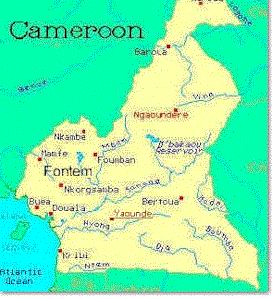
| Thirty
years after her last visit to Fontem (Cameroon) the Bangwa and Nweh-Mundani peoples celebrate Chiara Lubich’s return amongst them through traditional festivities.
|
 |
The
king of Fontem, Dr Lucas Njifua, called the Fon,
expressed
his gratitude with these words:
"The spirituality
of the Focolare has changed our people
especially through communicating
the presence of God
and Jesus’ wish: ‘That
all may be one’. This is very important.
It has helped
us resist warfare. Crime is non-existent here.
Those who live like this
do not have problems
in their families, dissension about land ownership,
recourse to witchcraft ..."
Through a big celebration, the Bangwa and Nweh-Mundani peoples welcomed Chiara
Lubich in Fontem, Cameroon, located in the middle of the forest. Chiara last
visited Fontem 30 years ago, in 1969.
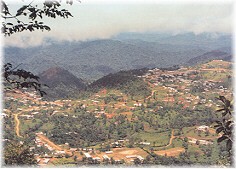 |
The clearing and the hill overlooking the village were packed with
people. The festivities consisted of songs and dances that exalted
the value of life: the dance of the fertility of the earth, the
dance of mothers of twins and, last of all, the dance of the Fon
and all the chiefs. |
The words of the Fon, endorsed by an enthusiastic applause, expressed gratitude
for the Focolare’s spiritual contribution to the people in addition to the many
social works accomplished by the Movement in Fontem. "When
we are in awe of God, then we are at peace. It helps us to maintain high moral
standards. This moral conscience is also important in the struggle against the
scourge of Aids."
The words of
Chiara and her final proposition were immediately embraced. The celebration
was sealed by a pact of mutual love among the whole people.
It was a strong moment, expressed with a hand shake, which created a powerful
bond among everyone.
"With this pact we are pledging our commitment to maintain full peace among
us and to rebuild it again each time it breaks down. Only while love continues
to shine in this city will heaven continue to send down its blessings on you,
on your children and on your grandchildren."
|
Actually the history of the little town of Fontem is marked by the experience of a "blessing from heaven". This blessing became manifest thirty years ago, in a small remote village in the forest where the Bangwa tribe risked becoming extinct due to the 90 percent infant mortality rate. |
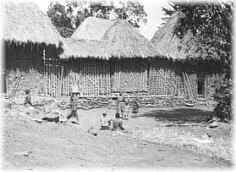 |
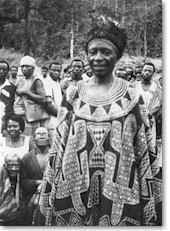 |
|
|
|
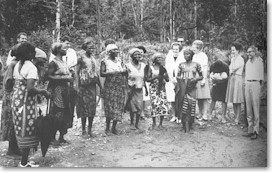 |
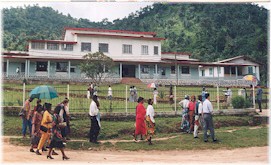 |
Now, before our eyes, we see a harmonious village with houses, a
church, a hospital, primary and secondary schools, a kindergarten
and cottage industries. |
Everyone was very moved when she recalled the words she had spoken on that occasion:
"Rising up in this place I
see a great city that will become famous all over the world, not because of
material wealth but because it will shine brightly with a light which is generated
by fraternal love kept alight amongst us in the name of God. Many people will
make their way to this city in order to learn how to love".
From that time this ‘city’ has been the destination of many from all over Africa
which is so troubled by ethnic conflicts. "Fontem
has become a beacon which radiates the light of mutual love throughout Africa
and indeed the whole world."
Over these
years the Bangwa and Nweh-Mundani peoples, who are animists, have come to know
Christianity.
Chiara in her talk recalled
the great message of the Jubilee, year of reconciliation and of forgiveness.
But not all those listening to her were Christians. Addressing those of other
churches or other religions, Chiara recalled the
Golden Rule which is present in all the religions in the words:
‘Do not do to others what you would not like
done to you’. "This
means," Chiara added, "that
all of us have to continue to love one another."
This is the vocation of Fontem.
That promise to live
mutual love brought a note of great solemnity. Those present were strongly
aware that mutual love is the guarantee that "the
vocation of Fontem will continue to be, also in future years, as Jesus said,
'a city on the mountaintop' so that everyone may see it and imitate its life."
|
The echo of Fontem over these years has reached the whole world
because the developments of this village are due to the contributions
from the members of the movement in all continents. |
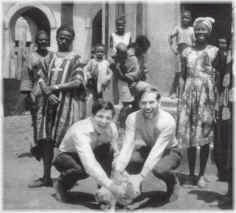 |
And as this sense of solidarity grew, so too did the discovery of the rich values and traditions of Africa.
(22-05-2000)
Last updated: 20.2.2002